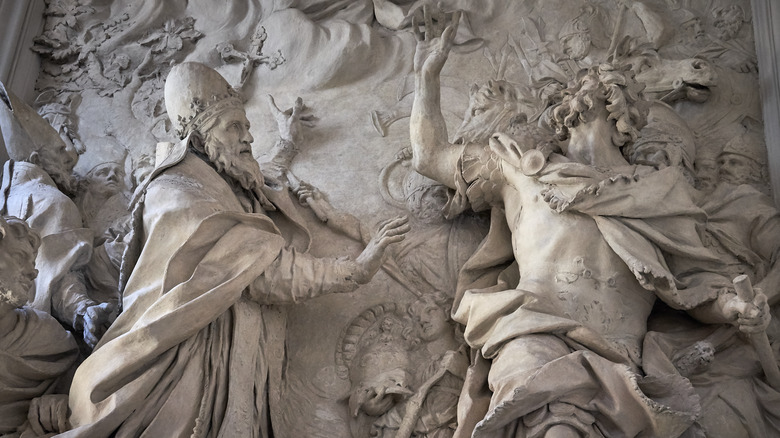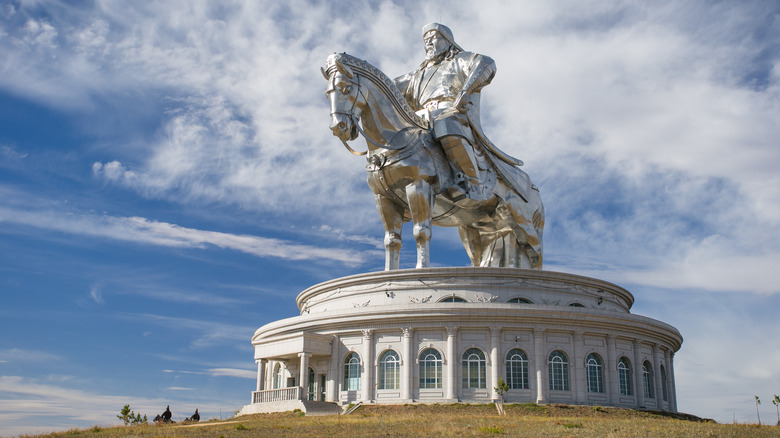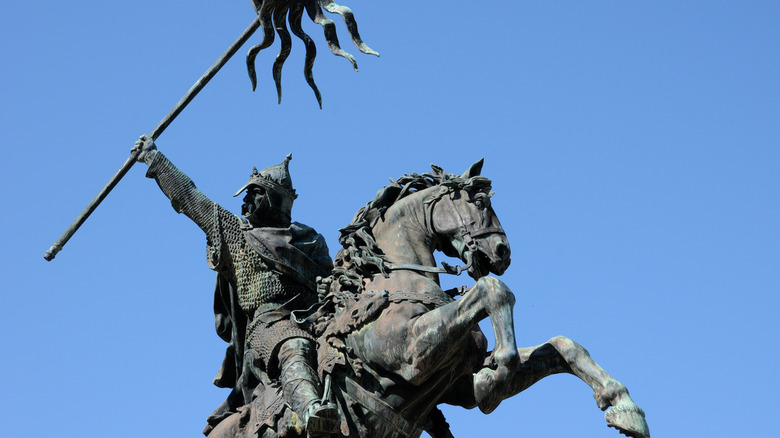Halley's Comet's Stunning Connection To Three Of History's Biggest Events
Halley's Comet is one of Earth's most well-known wonders in the night sky, which appears once every 75-76 years according to the National Space Centre. However, due to the comet's particular distinguished look, with its long, bright tail, many people throughout history believed the comet to be an omen, which foretold the outcome of events when it came to politics and war.
Halley's Comet influenced people like Genghis Khan, and his westward expansion; it was seen as a sign of the fall of Rome and helped convince the Normans that God was on their side and believed it was a just cause to invade England back in 1066 (via National Space Centre). All of these events were quite significant in their impact on human civilization, ad they were all preceded by a sighting of the rare comet. Were these changes in history directly affected by Halley's Comet coming at roughly the same time, and how was its sighting interpreted by those about to embark on game-changing events.
Omen of Doom
In the early fifth century, many prophets predicted that doom was coming to Rome. A number of cosmic disturbances occurred during time including a solar eclipse that blackened the sun, whilst casting a red hue over the moon's surface, a lunar eclipse that caused the same effect, and the appearance of the northern lights in more southern places than usual. These phenomina led many astrologers and prophets at the time to think a catastrophe was coming. When Halley's Comet appeared in A.D. 451, this only contributed to the superstitious fear many were feeling at the time, as the National Space Center notes.
As a matter of coincidence, shortly after Halley's Comet shined in the mid-fifth century, Attila the Hun who came from modern-day Kazakhstan invaded France. This would lead to a bloody campaign against the Roman Empire for the next year, ending at the Battle of the Catalaunian Plains, where the Huns were subsequently defeated, according to History. Though during Attila's war, many Romans gave him the name of "the scourge of God," and believed that his presence was a sign that God was trying to punish the sinners of the world, according to the National Space Center.
The Mongol Expansion
One of the most famous empires in history is the Mongol Empire which was headed by Genghis Khan in the early 13th century, according to World History. By uniting the Mongols, employing a writing system, appointing positions based on merit and skill instead of kinship and nepotism, along with being an excellent military tactician and warrior, Genghis Khan had created an empire encompassing more land than any other in history (via History).
However, Halley's Comet would play a significant role in convincing Genghis Khan that his empire should expand to the west. In 1222 the astronomical flying body soared westward across the sky, which Khan took as a sign that it was foretelling his destiny of eventually conquering the lands of Eastern Europe, according to the National Space Center. Genghis Khan himself would not be able to see this future, as he died due to battle-born internal injuries in 1227, but his descendants would continue expanding into Europe, as History points out, and fulfill Genghis Khan's self-proclaimed destiny.
Gift of God
In 1066, William the Conqueror — as he would become known later on — invaded England with what he believed was a proper right to the throne. The basis of his argument was that his distant cousin, and ruler of England at the time, Edward the Confessor had made a promise that William of Normandy would inherit the throne. Then in the year 1064, 13 years later, Harold Godwinson had agreed with William to keep the promise that his predecessor made, however, this wasn't upheld, and William accused Godwinson of attempting to take England for himself, according to the Royal Family. As a result, a war between Normandy and the Anglo-Saxons would soon begin.
William the Conqueror was supported by the Pope, along with the emperor of the Holy Roman Empire, but Halley's Comet also helped convince some people to believe that there was going to be a change in rulership over England, as the National Space Center says. The comet which appeared in the year 1066 was seen by William as a signal from God that he deserved the throne, and that the heavens were on his side, allegedly claiming, "It is a wonderful sign from Heaven," according to the National Space Center. Between many wars and battles, Halley's Comet seems to support a lot of people's claim to the throne, but it might just be part of humanity's struggle to make sense of what we don't yet understand.



